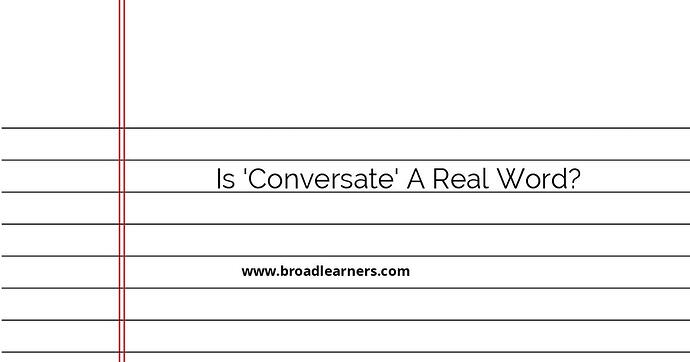The term 'conversate' is often a topic of discussion when it comes to English language usage. Many people wonder if it is a legitimate word or simply a common mistake for the more widely accepted word 'converse.' In this article, we will explore the origin, usage, and legitimacy of the word 'conversate' and provide clarity for English language learners.
- Origin of 'Conversate'
The word 'conversate' is often considered a back-formation from the word 'conversation.' A back-formation is a process in which a new word is formed by removing a supposed affix from an existing word. In this case, 'conversate' was formed by dropping the '-ion' from 'conversation,' creating a verb form.
- Usage in Historically Informal Contexts
'Conversate' has been used in colloquial and informal contexts, particularly in African American Vernacular English (AAVE), for quite some time. While it has gained some acceptance in these settings, it is not widely considered standard English in formal contexts.
- Is 'Conversate' a Real Word?
While 'conversate' can be found in some modern dictionaries and used informally, it's generally perceived as nonstandard in traditional English grammar. The more accepted term in formal English is 'converse,' which means to engage in conversation.
To better understand the usage of both words, let's examine their differences and provide examples:
Converse
'Converse' is the standard verb form used to describe the action of engaging in conversation. It is widely accepted in both written and spoken English.
Example:
During the meeting, the manager asked everyone to converse openly about their ideas.
Conversate
'Conversate' is often used in informal settings and can be found in various dialects and vernaculars. It's less commonly accepted within standard English.
Example:
At the family gathering, they loved to conversate about old times and cherished memories.
Conclusion: In summary, 'conversate' is recognized in informal and colloquial contexts but is not typically used in standard English. For formal writing and communication, 'converse' is the appropriate term. However, understanding and acknowledging 'conversate' can be valuable in appreciating diverse linguistic expressions and the rich variety within the English language.
Did I miss anything? Respond below
